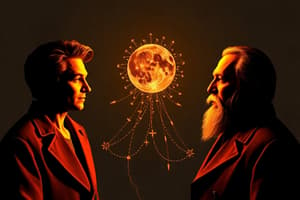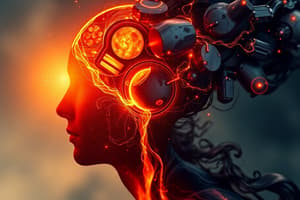Podcast
Questions and Answers
Which of the following best characterizes the core idea of philosophical monism?
Which of the following best characterizes the core idea of philosophical monism?
- Consciousness is an illusion created by complex neural processes.
- The mind and body are separate entities that operate independently.
- Consciousness and matter are fundamentally distinct and interact with each other.
- Reality consists of only one kind of substance or principle. (correct)
Epiphenomenalism, a challenge to materialism, suggests what about mental states?
Epiphenomenalism, a challenge to materialism, suggests what about mental states?
- Mental states are causally inert byproducts of physical processes. (correct)
- Mental states are the primary drivers of physical actions.
- Mental states can directly influence the physical world through quantum interactions.
- Mental states and physical states are identical.
George Berkeley's idealism posits that:
George Berkeley's idealism posits that:
- To be is to be perceived. (correct)
- Material objects exist independently of perception.
- Consciousness is an emergent property of complex physical systems.
- The physical world is the fundamental reality, and consciousness is secondary.
Which of the following is a primary challenge or critique of idealism as a theory of consciousness?
Which of the following is a primary challenge or critique of idealism as a theory of consciousness?
Panpsychism proposes that:
Panpsychism proposes that:
The 'binding problem' in the context of panpsychism refers to the challenge of explaining:
The 'binding problem' in the context of panpsychism refers to the challenge of explaining:
Neutral monism suggests that:
Neutral monism suggests that:
Which of the following statements accurately describes Descartes' substance dualism?
Which of the following statements accurately describes Descartes' substance dualism?
Property dualism, as proposed by Chalmers, suggests that:
Property dualism, as proposed by Chalmers, suggests that:
A primary challenge for dualism is explaining:
A primary challenge for dualism is explaining:
According to David Chalmers, 'easy problems' of consciousness include:
According to David Chalmers, 'easy problems' of consciousness include:
Chalmers' 'hard problem' of consciousness primarily concerns:
Chalmers' 'hard problem' of consciousness primarily concerns:
Qualia are best described as:
Qualia are best described as:
What role do 'thought experiments' play in exploring consciousness?
What role do 'thought experiments' play in exploring consciousness?
The 'inverted spectrum' thought experiment, attributed to John Locke, suggests that:
The 'inverted spectrum' thought experiment, attributed to John Locke, suggests that:
In Frank Jackson's 'Mary the color scientist' thought experiment, what is Mary expected to learn upon seeing color for the first time?
In Frank Jackson's 'Mary the color scientist' thought experiment, what is Mary expected to learn upon seeing color for the first time?
Thomas Nagel's 'what is it like to be a bat?' argument emphasizes:
Thomas Nagel's 'what is it like to be a bat?' argument emphasizes:
The concept of a 'philosophical zombie' (Chalmers) is used to argue that:
The concept of a 'philosophical zombie' (Chalmers) is used to argue that:
Ned Block distinguishes between phenomenal consciousness and access consciousness. Access consciousness refers to:
Ned Block distinguishes between phenomenal consciousness and access consciousness. Access consciousness refers to:
What does Dennett's idea of 'intuition pumps' refer to?
What does Dennett's idea of 'intuition pumps' refer to?
What is Dennett's position on qualia?
What is Dennett's position on qualia?
Grazziano's theory of consciousness suggests that it is fundamentally a:
Grazziano's theory of consciousness suggests that it is fundamentally a:
What does the 'consciousometer' thought experiment highlight?
What does the 'consciousometer' thought experiment highlight?
The fact that qualia are 'uniquely opaque to scientific investigation' implies:
The fact that qualia are 'uniquely opaque to scientific investigation' implies:
Mysterianism, as an approach to the hard problem of consciousness, suggests that:
Mysterianism, as an approach to the hard problem of consciousness, suggests that:
The idea that someday the "hard problem" will naturally resolve itself is based on the analogy of:
The idea that someday the "hard problem" will naturally resolve itself is based on the analogy of:
Proponents of the idea that 'consciousness is fundamental' argue that:
Proponents of the idea that 'consciousness is fundamental' argue that:
Andrei Linde suggests that the study of the universe and the study of consciousness are
Andrei Linde suggests that the study of the universe and the study of consciousness are
Chalmers suggests that further consideration is needed regarding fundemental theories because some theories:
Chalmers suggests that further consideration is needed regarding fundemental theories because some theories:
Flashcards
Monism
Monism
A philosophical view that only one kind of substance exists.
Materialism
Materialism
The idea that everything can be reduced to matter; every conscious state is associated with a different brain state.
Epiphenomenalism
Epiphenomenalism
Mental states have no causal role; they are like steam coming out of a steam engine.
Idealism
Idealism
Signup and view all the flashcards
Panpsychism
Panpsychism
Signup and view all the flashcards
Neutral Monism
Neutral Monism
Signup and view all the flashcards
Substance Dualism
Substance Dualism
Signup and view all the flashcards
Property Dualism
Property Dualism
Signup and view all the flashcards
Easy problems of consciousness
Easy problems of consciousness
Signup and view all the flashcards
Hard problem of consciousness
Hard problem of consciousness
Signup and view all the flashcards
Qualia
Qualia
Signup and view all the flashcards
Thought Experiment
Thought Experiment
Signup and view all the flashcards
Inverted Spectrum
Inverted Spectrum
Signup and view all the flashcards
Philosophical Zombie
Philosophical Zombie
Signup and view all the flashcards
Phenomenal Consciousness
Phenomenal Consciousness
Signup and view all the flashcards
Access Consciousness
Access Consciousness
Signup and view all the flashcards
Intuition pumps
Intuition pumps
Signup and view all the flashcards
Mysterianism
Mysterianism
Signup and view all the flashcards
There is no problem-
There is no problem-
Signup and view all the flashcards
Consciousness is fundamental
Consciousness is fundamental
Signup and view all the flashcards
Study Notes
- The class approaches consciousness with lots of philosophy.
- Many questions will not necessarily have a single right answer.
- The class considers ideas and evidence that challenges conventional science.
- The class has a motto of "Entertaining without endorsing."
Definition of Consciousness
- Consciousness is defined as "experiencing".
- Nagel suggests something is conscious if there is "something it is like to be" that something.
- It is theorized that we can never know what the experience of something, such as that of a bat, is like.
Monist Theories of Consciousness: Materialism
- Monism suggests there is only one kind of stuff in the world.
- Materialism suggests that everything can be reduced to matter.
- Every conscious state is associated with a different brain state, which is the prevailing scientific view.
- Challenges to materialism include making sense of "feelings", and understanding how consciousness could be causal.
- Epiphenonenalism suggests mental states have no causal role.
- Mental states are like steam coming out of a steam engine.
Monist Theories: Idealism
- Idealism theorizes that everything in the universe is a manifestation of consciousness.
- George Berkeley denies the existence of material substance.
- Objects like tables and chairs are only ideas in the minds of perceivers, and, as a result, cannot exist without being perceived.
- To be is to be perceived; everything is in the mind of God.
- Deepak Chopra theorizes we are not "physical machines that have somehow learned to think...[but] thoughts that have learned to create a physical machine", and that "We are the eyes of the universe looking at itself".
- Bernardo Kastrup theorizes that we and everything else are all the equivalent of dissociative identities within a larger consciousness.
- Patients with Dissociative Identity Disorder can have dreams where each identity is experiencing the dream from their own perspective.
Challenges for Idealism
- Idealism is not well regarded by most scientists and philosophers currently.
- It is hard to understand how consciousness could create matter, although dreaming could be a factor.
Alternative Types of Monism
- Panpsychism suggests all matter is conscious.
- Challenges include what levels are conscious of what and the binding problem.
- Is a chair conscious, or just its particles?
- How do individual conscious bits combine to form larger conscious wholes?
- Neutral Monism suggests the world is made of one kind of stuff that cannot be classified as either physical or mental.
- Challenges include not knowing what that stuff is, and how to get from monism to the distinct realms of physical and mental.
Dualism
- Dualism suggests that consciousness and matter are two wholly different things.
- Descartes, through meditations, imagined everything that could be doubted.
- Thought itself remained and states "I think therefore I am"
- Thought is incontrovertible
- Hypothesized that mind and body connected in the pineal gland
- Descartes assumed two distinct types of substances: extended stuff (matter) and unextended stuff (thought).
- Substance dualism (Descartes) theorized there are different kinds of stuff.
- Property dualism (Chalmers) theorizes that, although the world is composed of just one kind of substance—the physical kind, there exist two distinct kinds of properties: physical properties and mental properties.
Challenges with Dualism - Gilbert Ryle
- How can the mind interact with the body if they are two wholly different kinds of substances?
- This is the concept of Ghost in the machine:
- If one can influence the other then they must be using some kind of energy or matter, or some magic.
The Hard Problem of Consciousness: David Chalmers
- The easy problem is one that can be tackled by cognitive science with focus on discrimination.
- The hard problem is one, that even when there is explanation of the performance of all the cognitive and behavioral functions in the vicinity of experience, an unanswered question still remains:
- Why is the performance of these functions accompanied by experience; why not have information processing go on "in the dark" free of any inner feel; and why should physical processing give rise to a rich inner life?
Qualia
- Qualia is the subjective quality of experience.
- It can be described by smell of coffee, the color of red and/or the thrill of a roller coaster.
- A fundamental challenge is understanding how the brain creates qualia.
Thought Experiments
- Thought experiments are imagining situations that provide insight into difficult problems.
- Galileo showed the logical fallacy of Aristotle.
- Einstein did so by riding on a beam of light or from Inertia in an elevator.
- Thought experiments are a powerful tool in philosophy:
- Intuition pumps (Dennett) can highlight how thought experiments help clarify intuitions
Inverted Spectrum: John Locke
- It would be difficult to tell if other people's experience of the spectrum was reversed.
- This demonstrates the non-reportability of qualia
Mary the Color Scientist: Frank Jackson
- Mary is a brilliant scientist who is, for whatever reason, forced to investigate the world from a black and white room via a black and white television monitor.
- She specializes in the neurophysiology of vision and acquires, all the physical information there is to obtain about what goes on when we see ripe tomatoes, or the sky, and use terms like "red", "blue", and so on.
- The question becomes, what will happen when Mary is released from her black and white room or is given a color television monitor, and will she learn anything or not?
Answers
- The original view is that Mary will learn something new.
- Physical facts are not sufficient to understand qualia (Jackson/Chalmers).
- The alternative view is if Mary really knew everything there was to know she would not be surprised.
What is it Like to be a Bat? Thomas Nagel
- Bats have sonar that give them an entirely different way of understanding space and motion, which raises how that is experienced for them.
- It highlights the limitations to understanding others qualia.
- "We haven't the capacity “to extrapolate to the inner life of the bat from our own case....without changing my fundamental structure, my experiences would not be anything like the experiences of those animals”
Philosopher's Zombie (Chalmers)
- A Zombie is physically indistinguishable from a conscious human but it has no inner experience.
- There is nothing it is like to be a zombie, its not conscious, just like a non-conscious advanced AI.
- If it could be considered that zombies can be imagined like computers that behave just like people it suggests:
- Consciousness is not essential to mind
- There is no way to know whether something is conscious -Could just be a zombie
- The concept highlights the hard problem of consciousness
Access vs. Phenomenal Consciousness: Ned Block
- Phenomenal consciousness -what it is like to experience something.
- Access consciousness is what you are able to report:
- Is there more to phenomenal consciousness than just access consciousness?
- Belief in the possibility of philosophical zombies or that Mary learns something new then is a consideration.
Acquired Tastes
- Qualia is distinct indescribable nuggets of experience about which their experiencing subjects cannot be mistaken.
- What changes when a beer drinker learns to like beer, the taste of the beer or the opinion about it?
- If qualia cannot be pinned down then it cannot be a directly apprehensible raw feel.
Experience is an Illusion
- Difficulty pinning down qualia leads Dennett to suggest (sometimes) that it is an illusion.
- Are zombies possible? They're not just possible, they're actual; everyone is a zombie and nobody is conscious (Dennett, 1991).
- Grazziano draws the same conclusion.
- Recall Magritte's famous painting, "This is not a pipe”, consciousness is a representation of attention that has taken on a life of its own (Grazziano & Kastner, 2011).
Consciousometer
- What if scientists invented a device to test consciousness, but it informs that you lacked it.
- Would you accept their conclusion?
- This illustrates the self-evidence of subjective experience.
Implications of Thought Experiments of Qualia:
- Many have a strong intuition that qualia is both uniquely transparent to personal experience, and uniquely opaque to scientific investigation.
Alterative Approaches to the Hard Problem
- The human brain is not capable of solving the hard problem (Mysterianism).
- Tackle the easy problems first and the hard problem will naturally resolve itself, similar to biology as life was thought to be mysterious “Élan vital", and understood when DNA was discovered.
- Consciousness is fundamental, and a basic property of the physical world, corresponding to some aspect of the universe, perhaps pertaining to information (Chalmers/Penrose).
- Consciousness could be a fundamental aspect of the universe: -"Will it not turn out, with the further development of science, that the study of the universe and the study of consciousness are inseparably linked, and that ultimate progress in the one will be impossible without progress in the other" -Stanford Physicist Andrei Linde
- "I propose that conscious experience be considered a fundamental feature, irreducible to anything more basic... If existing fundamental theories cannot encompass it, then some- thing new is required" -David Chalmers.
Summary
- Definition of consciousness- equivalent to experience.
- Alternative general philosophical approaches to consciousness:
- Monism- Consciousness and Matter are the same
- Materialism- its all matter
- Idealism- its all consciousness
- Panpsychism- all matter is conscious
- Neutral monism- consciousness and matter correspond to one kind of stuff that is neither consciousness nor matter
- Dualism- Consciousness and Matter entail distinct realms
- Hard problem of consciousness - How does physical matter create consciousness?
- Thought experiments - Scenarios that illuminate challenging questions such as the hard problem.
- Possible approaches to the hard problem:
- Mysterianism - our brain will never solve it
- There is no problem - standard scientific approach will reveal it
- Consciousness is fundamental - A basic property of the universe
Studying That Suits You
Use AI to generate personalized quizzes and flashcards to suit your learning preferences.




